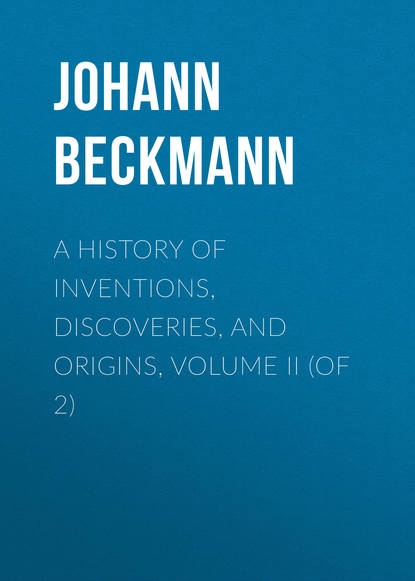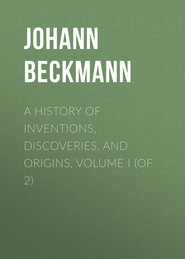По всем вопросам обращайтесь на: info@litportal.ru
(©) 2003-2024.
✖
A History of Inventions, Discoveries, and Origins, Volume II (of 2)
Настройки чтения
Размер шрифта
Высота строк
Поля
Der Büchernachdruck nach ächten Grundsätzen des Rechts geprüft. 1774, 4to.
1261
Diogenes Laert. lib. ix. 52. – Cicero de Nat. Deor. lib. i. cap. 23. – Lactantius De Ira, ix. 2. – Eusebius De Præparatione Evang. xiv. p. 19. – Minucius Felix, viii. 13.
1262
Livius, lib. xl. c. 29. – Plin. xiii. 13. – Plutarchus in Vita Numæ. – Lactantius de Falsa Relig. i. 25, 5. – Valer. Max. i. cap. 1, 12.
1263
Sueton. lib. ii. cap. 31.
1264
The whole circumstance is related by Seneca the rhetorician, in the introduction to the fifth, or, as others reckon, the tenth book of his Controversiæ.
1265
Taciti Annal. lib. i. c. 72. Bayle, in his Dictionary, has endeavoured to clear up some doubts respecting the history of Cassius and Labienus. See the article Cassius.
1266
Tacit. Annal. lib. iv. cap. 35.
1267
Maccab. ii.
1268
Adversus Gentes, lib. iii.
1269
Hist. Eccles. 1. viii. cap. 2. Suidas says the same.
1270
Socrates, lib. i. cap. 6.
1271
Digestor, lib. x. tit. 2, 4, 1.
1272
Baillet, Jugemens des Sçavans, 4to, i. p. 26.
1273
Paris, 1738–40, 4to, vol. viii.
1274
Argentinæ 1749, fol.
1275
Codex Diplomaticus. Franc. 1758, 4to, iv. p. 460. An account of the establishment of a book-censor at Mentz may be found also in G. C. Johannis Rerum Mogunt. i. p. 798.
1276
The whole bull may be seen in Baronii Annales Ecclesiastici tom. xix. Colon. 1691, p. 514.
1277
Baillet, Jugemens des Sçavans, i. p. 19.
1278
Der Büchernachdruck nach ächten Grundsätzen des Rechts geprüft.
1279
Von denen altesten kayserlichen und landesherrlichen Bücherdruck-oder Verlag-privilegien, 1777, 8vo.
1280
Vol. xvi. p. 96.
1281
[Exclusive privileges for printing the English Bible and Prayer have been granted by the Crown at different periods up to the present time, with the exception of the period of the Commonwealth, during which they were abolished. In the 27th year of Charles II. a Royal patent was granted to Thomas Newcomb and Henry Hills. In the 12th of Anne to Benjamin Tooke and John Barber; in the 22nd of George I. to John Basket. Then came John Reeves, who received his patent from George III. in the 39th year of his reign, and in association with George Eyre and Andrew Strahan, printed the many editions of the Bible and Prayer described as Reeves’ editions. The present patent was conferred by George IV. upon Andrew Strahan, George Eyre, and Andrew Spottiswoode, for a term of thirty years, which commenced January 21, 1830, and consequently ceases in 1860. By this last patent every one but the patentees is prohibited from printing in England any Bible or New Testament in the English tongue, of any translation, with or without notes; or any Prayers, Rites, or Ceremonies of the United Church of England and Ireland; or any books commanded to be used by the Crown; nor can either of the above be imported from abroad, if printed in English, or in English mixed with any other tongue. The Universities of Oxford and Cambridge also enjoy the right of printing Bibles, &c., in common with the patentees; but in their case it is a simple affair of permission, they having no power to prohibit or prosecute. The present patentees, it may be here observed, have not of late years attempted to enforce their rights, and Bibles are now printed almost ad libitum.
In Scotland, prior to 1700, various persons held concurrent licenses, consequently it is very difficult to say who were king’s printers and who were not. On July 6, 1716, George I. granted a patent to John Basket, the English patentee, and Agnes Campbell, jointly for forty-one years. To them succeeded Alexander Kincaird, whose patent dates from June 21, 1749; and then James Hunter Blair and John Bruce, whose patent commenced in 1798 and expired in the hands of their heirs, Sir D. H. Blair and Miss Bruce. In 1833 the patent ceased, and has never been renewed. Unlike either England or Ireland, the four Scotch Universities have never participated in this monopoly.
In Ireland, George III. in 1766 granted a Bible patent to Boulter Grierson for forty years. He was succeeded by his son George Grierson, who, in 1811, obtained a renewal, and is still with Mr. Keene, the Irish patentee. Trinity College, Dublin, has also a concurrent right, but both Oxford and Cambridge are, by the Irish printers’ own patent, permitted to import their Bibles into Ireland. – Dr. Campbell’s Letters on the Bible Monopoly.]
1282
Several of them were editors, printers, and proprietors of the books which they sold.
1283
Their lamentable petition of the year 1472 has been inserted by Fabricius in his Bibliotheca Latina. Hamburghi, 1772, 8vo, iii. p. 898. See also Pütter von Büchernachdruck, p. 29.
1284






